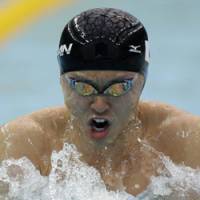With four Olympic gold medals on his sterling resume, breaststroker Kosuke Kitajima has already attained a level of success that millions of athletes can only dream of.
Now, with the spotlight on the 13th FINA World Championships being held in Rome, Kitajima, serving as a commentator for TV Asahi in the Italian capital, is content to be on sabbatical from the high-stakes pressure of elite competition.
This doesn't mean, however, that once the world championships conclude Japan's most famous swimmer can't leave his comfortable new surroundings in Los Angeles and resume his possible quest for a third straight breaststroke double by returning to the Tokyo Swimming Center, his longtime training center, at any time.
The next Olympiad is still three years away. That's a long, long time in athletics — light years in the eyes of astronauts — especially in the constantly changing world of Olympic sports.
Thus, this is certain: Kitajima, who turns 27 next month, doesn't need to make any rash decisions today.
It's perfectly sensible for him to continue training at the University of Southern California, where Trojans coach Dave Salo has helped guide his workouts. Salo, whose extensive coaching experience includes working with U.S. Olympians, could teach the gifted technical swimmer a few things as well.
(It would be comparable to New England Patriots quarterback Tom Brady picking up a few pointers from former Washington Redskins head coach Joe Gibbs in the offseason.)
I believe Kitajima can benefit from Salo's coaching expertise while taking a break from his "normal" life in Tokyo.
(And really, how normal is life in a densely populated megalopolis where everyone knows your name and recognizes your face?)
In an interview with Swimming World Magazine in August 2005, Salo explained his coaching philosophy by saying, "I took the approach of trying to develop a 'minimal model' that would lead to peak performance. Specifically, I asked, what is the least amount of work a swimmer can do that will still allow him to produce his best possible performance? Back then, some of my critics thought I was trying to find the easy way out. Actually, what I've been trying to do is find the most efficient means to produce peak performance."
Kitajima is an efficient swimmer, one blessed with speed, power and a phenomenal ability to excel in the biggest events. He's also known for producing peak performance, and for that trademark skill credit must go to his longtime coach, Norimasa Hirai, who has guided him from his days as a standout junior swimmer as he developed into a world-class performer.
The recently married Hirai can probably also use a break from the high-pressure job of working with his top pupil.
For now, though, Kitajima is perfectly content to train at USC and have the opportunity to brush up on his English skills.
It's a smart move for Kitajima.
As he has demonstrated over the years, he has benefited from participating in high-altitude training camps in Arizona by winning races and setting world records in the world championships and in the Olympics.
Watching several of those training sessions, I was left with this impression: He takes immense pride in every detail of his workouts, placing as much importance on the first stroke as he does on the final one.
But now, he has the enviable opportunity to take a break from his hectic life in Japan and set his own timetable for his return to elite-level competition.
And it's better for him to do this now than in, say, 2011.
Why?
Kitajima has plenty of time to regain his competitive fire.
It's natural for many elite athletes to lose motivation in the months after the Olympics. So it's safe to suggest that Kitajima is in his comfort zone now, plotting his return.
According to recent news reports, Kitajima will make his much-anticipated return to the pool for Japan's national championships next spring, and then set his sights on quality performances at the Pan Pacific Swimming Championships in August and the Asian Swimming Championships in November.
Kitajima has earned the right to step away from the spotlight. And if he decides that he doesn't want to pursue another Olympic medal, then his experience in California for however long it will be, will just be a different sort of chapter in his life.
That said, people will be intrigued to see if Kitajima can capture gold medals in the 100- and 200-meter breaststroke at the 2012 London Games.
The waiting game is only in the opening stages, folks.


















With your current subscription plan you can comment on stories. However, before writing your first comment, please create a display name in the Profile section of your subscriber account page.